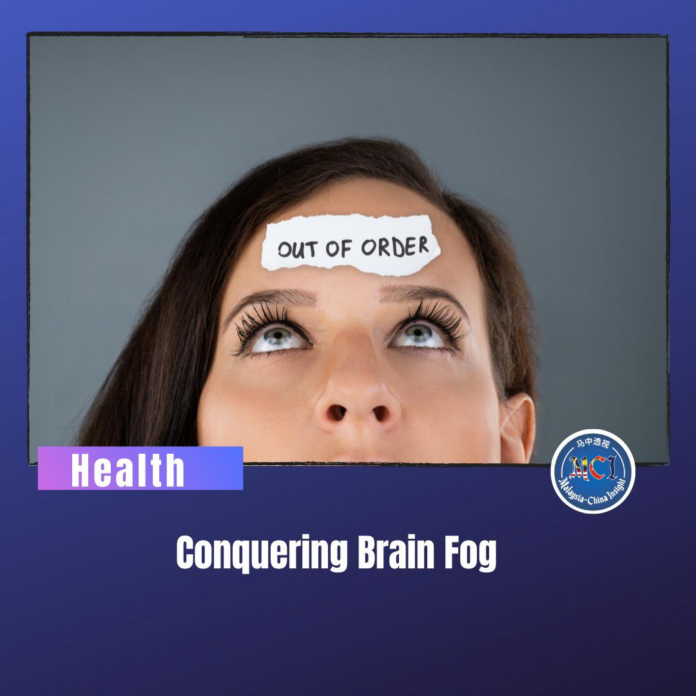In a bustling city of Kuala Lumpur nestled amidst towering skyscrapers, a young professional named Watie. Watie was known for her sharp intellect, quick thinking, and exceptional memory. She was always on top of her game, effortlessly juggling tasks and excelling in her demanding job.
But that afternoon slum is real, Watie feeling fatigued as the day rolls on might has reaching for coffee or a snack. She thought that it could be the amount of protein in her system that’s causing her eyes to glaze over. An unexpected visitor arrived in Watie’s life – brain fog. It crept in like a silent mist, slowly enveloping her once crystal-clear mind. At first, she dismissed it as mere fatigue, attributing it to a few late nights and long work hours. However, as days turned into weeks, the fog grew thicker, and Watie couldn’t ignore it any longer.
Watie found herself struggling to concentrate during important meetings, her once excellent memory failing her when she needed it the most. It felt as if her thoughts were trapped in a dense cloud, making it difficult to process information and make decisions. She became increasingly forgetful, misplacing items and struggling to recall even the simplest of details.
Confusion and frustration clouded Waties’s spirit as she desperately sought answers to this newfound obstacle in her life. With determination, she embarked on a journey to uncover the causes of her brain fog and find a way to reclaim her mental clarity.
She enlisted the help of medical professionals, who delved into her medical history and conducted various tests. Together, they discovered that Watie’s brain fog was not an isolated incident. Instead, it was an amalgamation of factors affecting her cognitive function.
The first piece of the puzzle revealed that Watie’s sleep patterns had become disrupted due to her demanding work schedule and personal commitments, leaving her physically and mentally exhausted. Addressing this, Watie prioritized her well-being by establishing a consistent sleep routine and engaging in relaxation techniques to improve the quality of her slumber.
Further exploration uncovered another contributing factor: stress. Watie had been shouldering an immense amount of pressure, both professionally and personally, which had taken a toll on her mental clarity. She sought solace in mindfulness practices, meditation, praying and yoga to find balance and alleviate the internal noise that had clouded her thoughts.
Additionally, Watie’s diet lacked essential nutrients, leaving her brain deprived of the fuel it needed to function optimally. With the guidance of a nutritionist, she adopted a nourishing, balanced eating plan that incorporated brain-boosting foods rich in vitamins, minerals, and omega-3 fatty acids.
Many people do not get enough magnesium in their diet, which may negatively impact brain health and lead to brain fog symptoms such as difficulty concentrating. A study in 2,466 people ages 60 and up found that those with higher magnesium levels did better on tests of cognitive functions like attention and memory and had lower risks of developing cognitive impairment than those with lower magnesium levels. Other than that, lack of L-theanine, a compound that found in green tea and low levels of B vitamins may contribute too. Having low levels of certain nutrients may contribute to or cause brain fog-related symptoms, so supplementation with these nutrients may help.
“Brain fog, in general, is possible from too much protein, as a sugar deficit for the brain can cause your brain to actually shrink,” expert explains. “carbs are the brain’s main source of energy, and without enough, it will be hard to concentrate.” Overeating protein means that you might be displacing your carbs.
As Watie slowly implemented these changes in her life, the fog began to lift. Her mental sharpness returned, and she regained her confidence in her abilities. Along this journey, she also discovered the importance of self-care, setting boundaries, and seeking support when needed.
Though the road to clarity was not always smooth, Watie’s determination and resilience guided her towards a brighter, clearer future. She emerged from the haze of brain fog stronger and more aware of the importance of taking care of her mental well-being.
Watie’s story serves as a reminder to all that sometimes life’s unexpected challenges can cloud our minds, but with perseverance, self-care, and the right support, we can overcome the fog and rediscover the clarity and brilliance that lie within us. However, brain fog has many possible causes, some of which are serious. It’s essential to work with a healthcare professional to get proper care.



















